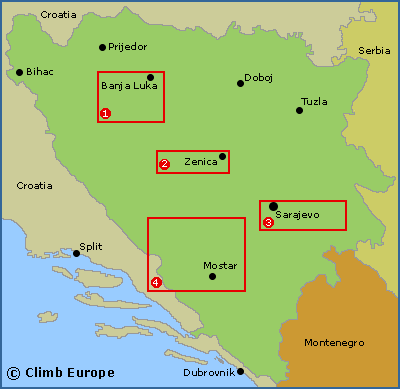Rock climbing in Bosnia and Herzegovina
Bosnia and Herzegovina has been an underrated climbing destination in Europe. It is a great location for a rock climbing holiday to get off the beaten track, experience a different culture, and climb on routes that aren’t polished and avoid the crowds. Bosnia and Herzegovina is a country rich with diverse mountain landscapes, rocky canyons, hilly forests, quiet villages, welcoming locals, great food and plenty of high-quality limestone crags in wild romantic locations.
Map showing the main rock climbing areas in Bosnia and Herzegovina

The map shows the 4 main rock climbing areas in Bosnia and Herzegovina, which are:
(1) Krajina Region in northwest Bosnia around Banja Luka
(2) Central Bosnia around Zenica
There are 12 separate crags in the Krajina Region, and it is the largest climbing area in Bosnia and Herzegovina, with Pecka and the Tijesno Canyon being the standout crags.
Pecka is one of the best, largest and most beautiful sport climbing areas in Bosnia and Herzegovina. The crag lies in a remote area full of green forests close to the village of Ubovica Brdo. The limestone rock is extremely pocketed with a mixture of sharp crimpy edges. Here there are over 120 sport single pitch sport routes, with most of these in the F5a to F7c grade range.
The Tijesno Canyon has finger like ridges that face both east and west. The climbing is very varied, on solid limestone rock of different colours, styles, and angles. There are 58 multi-pitch routes up to 210m high along with over 130 single pitch routes mostly in the F6a to F7c grade range.
Rock climbing in Central Bosnia around Zenica
Central Bosnia is very mountainous area with a good network mountain huts. In terms of sport climbing there are 7 small crags with over 80 routes in total. These areas have only been bolted since 2015 and there is a lot of potential for new routes that are still hiding in the forests, mountains and caves of Central Bosnia.
Sarajevo is situated in a basin that is surrounded by green hills, mountains and canyons. There is a rich history of climbing within Sarajevo with 8 established crags, situated on all sides of the city. There are 3 crags situated close to the city centre including Dariva one of the oldest sport climbing areas within Bosnia. Bukovik and Ormanj are further away from the city and offer compact picturesque climbing.
Herzegovina has a growing number of high class and comfortable sport climbing areas (9 in total) that can be climbed all year round. Dreznica is the oldest crag situated in a picturesque canyon with over 100 routes mainly from F5a to F6c. There are a couple of crags close to the centre of Mostar, whilst Blagaj is the largest climbing area in the country with over 220 routes in a spectacular location.
Bosnia and Herzegovina climbing logistics
The only comprehensive guidebook available is simply called Bosnia and Herzegovina rock climbing guidebook that covers 45 separated crags. In total it details 1,540 single pitch sport routes, 123 multi pitch routes and 2 bouldering areas with 131 boulder problems. It also includes valuable information regarding travel and accommodation.
Sarajevo is the main International airport for getting to Bosnia and Herzegovina, though there are smaller International airports at Tuzla, Banja Luka and Mostar. Other options include flying into neighbouring Croatia (Zagreb, Split or Dubrovnik) and driving into Bosnia. Car hire is relatively cheap in Bosnia and Herzegovina, as is accommodation with plenty of options from hotels, motels, hostels and pensions.
